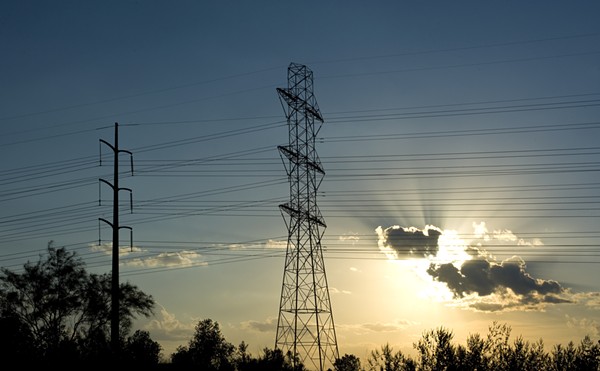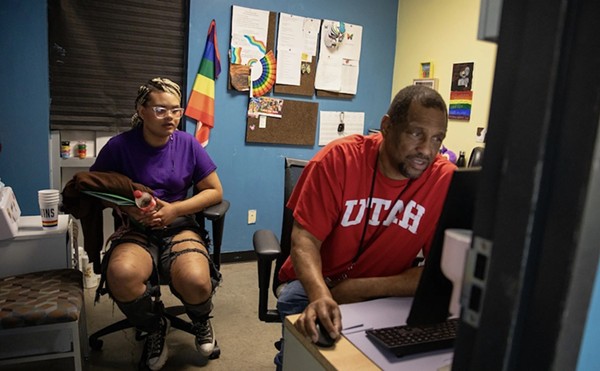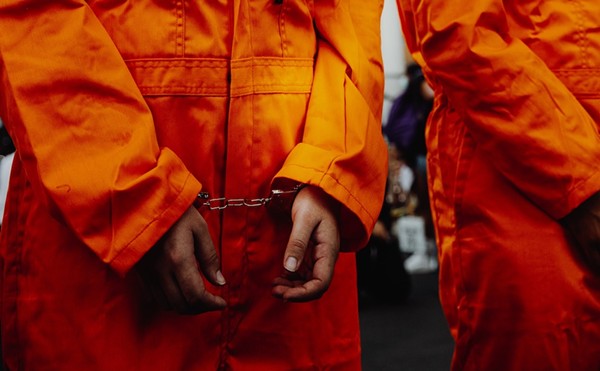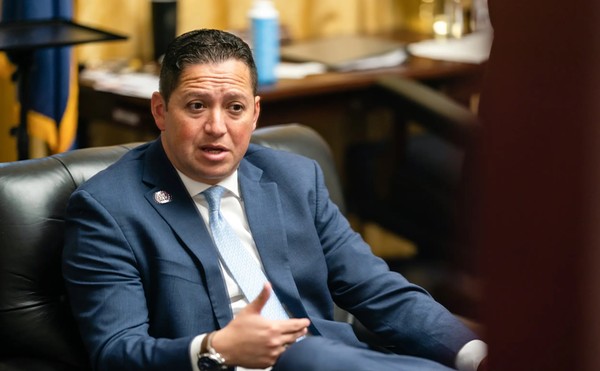"Is it ignorance or apathy / I forget these lessons taught to me / Some say life isn't fair / Hey I don't know and I don't care."
— Jimmy Buffett
Of course you can't vote in the upcoming elections. Halo 4 goes on sale Nov. 6.
Besides, why bother?
According to the electoral "return on investment" calculus published by Nate Silver of NY Times blog FiveThirtyEight, Republican Party presidential candidate Mitt Romney enjoys a 99.7 percent probability of winning Texas. (Although it's worth noting that incumbent President Barack Obama won Bexar County in 2008.) In our winner-take-all Electoral College system, Romney's virtually guaranteed our state's 38 electoral votes. Electoral ROI defines, "The relative likelihood that an individual voter would determine the Electoral College winner." The relative ROI value in Texas is less than 0.1, versus, say 8.6 in Ohio.
With such paltry return on your ballot investment, why would you spend your time, gasoline, or brainpower on voting, whether you are Republican, Democrat, minor party, or independent?
It has been long argued that, due to the Electoral College system, this dynamic drives down voter participation, especially in highly partisan states. According to the Cook Partisan Voting Index, a generic Republican presidential candidate in Texas should receive 10 percentage points more votes than the national average. (Utah and Wyoming, at +R20, are the reddest states in the union; Texas stands among only 12 states with a double-digit CPVI among 29 red states overall.)
Go figure, Texas has among the lowest voter turnout rates in the United States. And Bexar County rates are even lower than the state average. In the last presidential electoral cycle in 2008, voter turnout in Texas reached 59.5 percent of registered voters. in Bexar, the proportion was 56.5 percent. Even in the hotly contested 2000 Bush-Gore race, in which Texas Gov. George W. Bush led the Republican ticket, voter turnout in Texas was a mere 51.8 percent; in Bexar it was 47.3 percent — less than half. (Votes cast as a proportion of registered voters is a less accurate measure than votes cast versus eligible voters, however.)
Electoral apathy might come as kind of a surprise given the fact that Texans generally consider themselves a patriotic bunch. Voting is like eating apple pies or chopping down cherry trees. Anyone who has been through a public education system in any state in the nation has been prevailed upon again and again to cherish their right to vote: it's a freedom, a right, a civic duty. It is why, "In a democracy, people get the government they deserve." Voting should matter in the Lone Star State: In 1845, after the administration of President James Polk stole it fair and square from Mexico, Texas was admitted to the United States by just one vote.
In fact, Texans are not only not voting, too many are not even bothering to register. The number of registered voters in Bexar County totaled 871,042 in the 2000 presidential elections. Even with this year's heated presidential contest and a barrage of both partisan and nonpartisan registration campaigns, the number only ticked up to 920,267 as of press time, a scant 6 percent increase between the 2000 and 2012 presidential elections. By contrast, during nearly the same time period, July 2000 to July 2011, the population of Bexar County exploded by 26 percent from 1.40 million to 1.76 million, according to Census Bureau midyear estimates. (The July 2011 figure is the most recent available.)
And guess who tends to vote? "Generally what we find is that when you have lower voter participation it tends to be those who have a higher socioeconomic status who are over-represented in terms of voting, so you're not getting the full voice of the people," says Patricia Jaramillo, professor of political science at the UTSA College of Public Policy. Having "voice" in government may seem intangible on election day. Over the time horizon, though, lack of voice translates into tangible losses in share of public resources and economic benefits secured for constituents, and the short end of the stick during the construction of policies that favor one interest group at the expense of others. Some things in life really are zero sum.
The myriad factors trending voters toward a general decline in electoral participation in the U.S., and, in fact, across industrial countries worldwide, so far elude consensus among social scientists. It's socioeconomic; it's cultural; it's structural; it's maybe even genetic. Moreover, scant scholarship has been devoted to determining if or how high voter turnout really matters to either a society's ability to function, the life satisfaction of its inhabitants, or even the happiness of active voters.
Back in 1998, a team of researchers led by Daniel Gilbert of the Harvard University Department of Psychology and including Elizabeth Pinel and Stephen Blumberg of the UT Austin Department of Psychology polled voters during the 1990 Texas gubernatorial election (won by George W. Bush), asking how they would feel one month after the election if their candidate had lost. Respondents expected to feel miserable, but in a follow-up one month later the results, "apparently had no effect on the voters' general happiness."
So maybe it doesn't matter after all. Except we at the Current think it does. Just imagine what our country would look like if voter turnout dropped to zero: systemic collapse. So we're presenting a list of 10 reasons why you should get off your sofa and vote. Take your pick.
And in the interest of fairness, we're also enumerating a list of five viable reasons why you might abstain. If none of these five reasons apply to you, refer back to the first list. Then go get in line for your ballot.
1. You Can. Though some white, landowning, church-going males (not Catholics or Jews, of course) enjoyed some local suffrage in Colonial America, it wasn't until 1789 that the first U.S. presidential elections were held; until 1870 that non-whites gained the right to vote; until 1920 that women won suffrage; until the 1930s that most states granted poll access to "paupers"; until 1965 that the Voting Rights Act did away with the remaining Jim Crow laws that disenfranchised southern blacks; and until 1971 that adults under the age of 21 secured a constitutional guarantee of suffrage. And with voter suppression initiatives spreading like mala hierba, if you don't vote those hard-won rights may be rolled back.
2. You Is Local. Former U.S. Speaker of the House Tip O'Neill famously coined the phrase, "All politics is local," and most choices on the 2012 Bexar ballot concern local-level decisions. The hottest issue du jour in San Antonio is undoubtedly the "Pre-K 4 SA" initiative, which would boost the sales tax rate by 0.125 percent to the state cap of 8.25 percent in order to fund free full-day public preschool for qualifying four-year olds. At a time when public antipathy toward "raising taxes" ranks just below "raising anthrax cultures," Mayor Julián Castro's gambit might prove risky. In fact, he has declared that he is, "staking his tenure," on the program, backing it with a $363,000 PR campaign funded largely by area businesses. "When you are asking voters to approve a tax increase you have to make sure that people understand the purpose of it and that they believe in the purpose," says Robbie Greenblum, senior advisor to the pre-K campaign. "The evidence of the benefits is compelling." Cost of tax hike to median household: $7.81 per year; savings to median household: unknown, but Texas, which builds prison cells for the future based on fourth-grade literacy rates, spends $2.5 billion per year alone to incarcerate felons.
3. You Live Under The Lone Star. Texas residents will elect more than two dozen state officials on the 2012 ballot (some of which are district-dependent), and the stakes are anything but meager. Examples? Two commissioners of the three-member Railroad Commission, which regulates all oil and natural gas activity in the state (and has nothing to do with railroads). That includes the massive Eagle Ford Shale site, the exploitation of which last year paid out $186 million in salaries to county residents — but has also raised environmental concerns for its vigorous fracking, now ranking among the most nation's most active sites. In addition, Texas voters will renew the entire State Board of Education, which, among other duties, mandates all public school curriculum and selects textbooks. Also up for grabs: three Texas Supreme Court Justices and justices in the 4th Court of Appeals district, judges for the Criminal Court of Appeals (including the presiding judge) and lower district courts, and your district's state senator and representative.
4. You Live In CD-23. Five House of Representative congressional districts overlap Bexar County, the 20th, 21st, 23rd, 28th and 35th, meaning we'll have clout in the election of five lower-house seats with play on Capitol Hill. Two of those seats are held by Republicans, two by Democrats, one is new (but expected to go to Democrat Lloyd Doggett), and four out of five are boring races. The sprawling 23rd CD, though, remains a complete toss-up. Tea Partier and San Antonio businessman Francisco "Quico" Canseco, Republican, edged U.S. Rep. Ciro Rodriguez, a Democrat also from Alamo City, in the 2010 midterm Republican surge. But Quico now faces a tough challenge from Democratic state Rep. Pete Gallego, who could tip the House back toward the Dems. Pollsters say Gallego eked out a narrow edge after the Democratic National Convention, but Quico reclaimed it after the first presidential debate. The race has become one of the mostly closely watched in the nation; at this point, it's too close to call.
5. You're Hip. And still have your original hips. It's well known that youth vote in far lower numbers than their parents and grandparents. In Bexar County, 60 percent of our voters are 55 or older, and the highest participating demographic is aged 65 to 74. "All the young people who aren't voting are letting me make their decisions for them," quips Phyllis Ingram, president of the San Antonio League of Women Voters of the San Antonio Area. "Voting is habit-forming," says UTSA's Jaramillo. "So if you can get the youth to vote early, they're more likely to continue to turn out." Maybe if they only knew more about the process. "It's going to be fun," predicts 20-year-old Northwest Vista College student Alyssa Swanson, preparing for her first electoral effort. "Don't they have those weird machines you go into? I can't wait for that experience."
6. Show You The Money. In 2008, the Obama campaign spent $11 per vote, while challenger John McCain ponied up $6. The pot will be even richer this time around. In the 2012 Republican primaries alone, Romney flooded the field with his $19-per-vote ante. Battleground states receive the lion's share of presidential adspend — but state and local offices have deep pockets, too. In the past 2010 cycle, Gov. Rick Perry's campaign spent $15 for every vote he received; Democrat Bill White spent $12, not including Super PAC cash. But resources are allocated for likely voters, not for those on the sidelines. "There's no question about it," says Texas Legislature Representative Joaquín Castro, currently running for U.S. Congressional District 35. "[Campaigns] tend to target people who have already availed themselves to the system, and what you get is a funnel effect as that pool [of likely voters] seems to be getting smaller and smaller and smaller. The candidates go after the people who have voted, and [campaign] resources are limited, so it's understandable. That's fine for the candidates, but when you think about the larger society — that's not best for the larger society."
7. Flex Your Demography. Texas took a hit this month as the National Election Pool, a media consortium that conducts the only major exit poll, announced that we are among 19 states that will be eliminated from state-level exit polls next month amid rising costs. Nevertheless, consortium pollster Edison Research said it will still sample Texans for its national survey results. More than 100 demographic variables are covered, including age, race, gender, Hispanic descent, sexual orientation, age of children in household, marital status, political party, political orientation, employment status, education, religion, sexual orientation, and family income. Atheist or evangelical? White or black? Gay or straight? Rich or poor? Your candidates may not win, but electoral data miners will still tabulate your demography.
8. Por La Raza. Two fresh reports this month from the nonpartisan Pew Hispanic Center revealed that the population of Latinos eligible to vote next month has surged to 26 percent of the Texas electorate, and that those voters represent a potential Democratic goldmine: They prefer Obama over Romney by 69 percent to 21 percent and some 61 percent favor the Democratic Party, up from 45 percent in 2011. But according to the U.S. Census, only 38 percent of eligible Latino voters cast a ballot in Texas in 2008, down from 42 percent in 2004. By comparison, 57 percent of California's eligible Latino voters went to the polls in 2008, up from 47 percent in 2004. "Latinos will go out and vote if they are mobilized and they understand that there is a stake in their participation." says Arturo Vega, associate professor and director of the St. Mary's University Public Administration Graduate Program. "Voting is a question of opportunity cost, and because they're not being mobilized [by campaigns targeting consistent voters], the opportunity cost for Latinos is much higher than for their counterparts."
9. It's Easy. Even easier than helping Master Chief survive on Halo 4's Requiem planet. "A lot of my friends can't be bothered to either change addresses [to maintain valid voter registration] or do the paperwork to register for the first time," says Boerne resident Josh Bradshaw of England. "It kind of pisses me off, you know, because it's a big deal. If I were an American I'd vote for sure, so it surprises me that so many people are turned off and apathetic. It's really easy, just go online." (See our sidebar for more information on how.)
10. It's Your Duty. "We're blessed to live in the most democratic country in the world, and people not only have the right, but in my profession I think I can say they have the duty to come to the polls," says Bexar County Elections Administrator Jacquelyn Callanen. "When we see what the military is going through to protect democracies, my personal thought is that it really is a duty. It's really hard for us to be sending ballots out to Afghanistan and worldwide and then to have someone who is sitting a block away from a polling site not get up and go vote, that's really a huge dichotomy. We get [absentee ballot] requests from our military worldwide, and you get an email back that says, 'Thank you, ma'am, it's really important to me.' How do we match that kind of service with some of our citizens here that don't take the time to go vote?"
VOTER MANUAL
• The new state voter ID law failed to pass muster at either the U.S. Justice Department or in federal courts, so no matter what you've heard, you do not need any special photo card to vote. A drivers license or even a current utility bill or bank statement is enough (see votetexas.gov/register-to-vote/need-id for a list of optional forms of ID).
• If you haven't already done so, it's too late to register for the 2012 election. Pity, it was this easy: Go to elections.bexar.org and click on the "Register to Vote" icon on the left-hand side of the page. On the same page, you can also easily verify your registration or locate your precinct and voting booth (which you can also find through the automated (210) 335-VOTE phone system), and download a list of early-voting stations.
• If you have registered at any point in the past, and have not moved since, your registration remains valid (unless you are serving a sentence or parole as a felon, or the courts have declared you unfit to vote). Early voting, permitting you to walk in and vote at your convenience, begins October 22 (and ends November 2); the last day to accept mail applications is October 30; and Election Day is Nov. 6. Unless you obtain an absentee "mail-in" ballot, you will need to show up at your designated booth. Curbside voting is available for the disabled or elderly, but you should contact your precinct beforehand so they expect you.


















